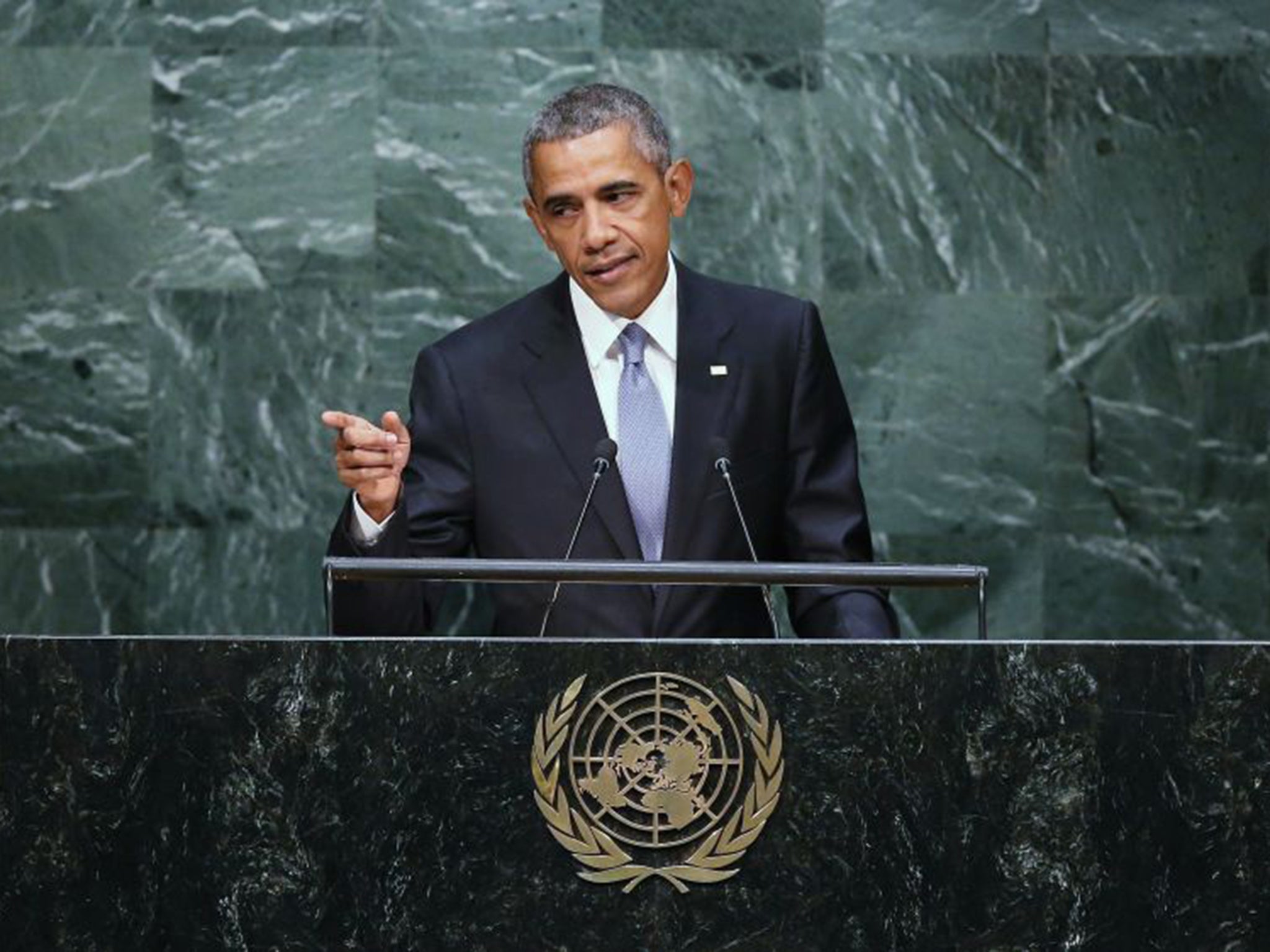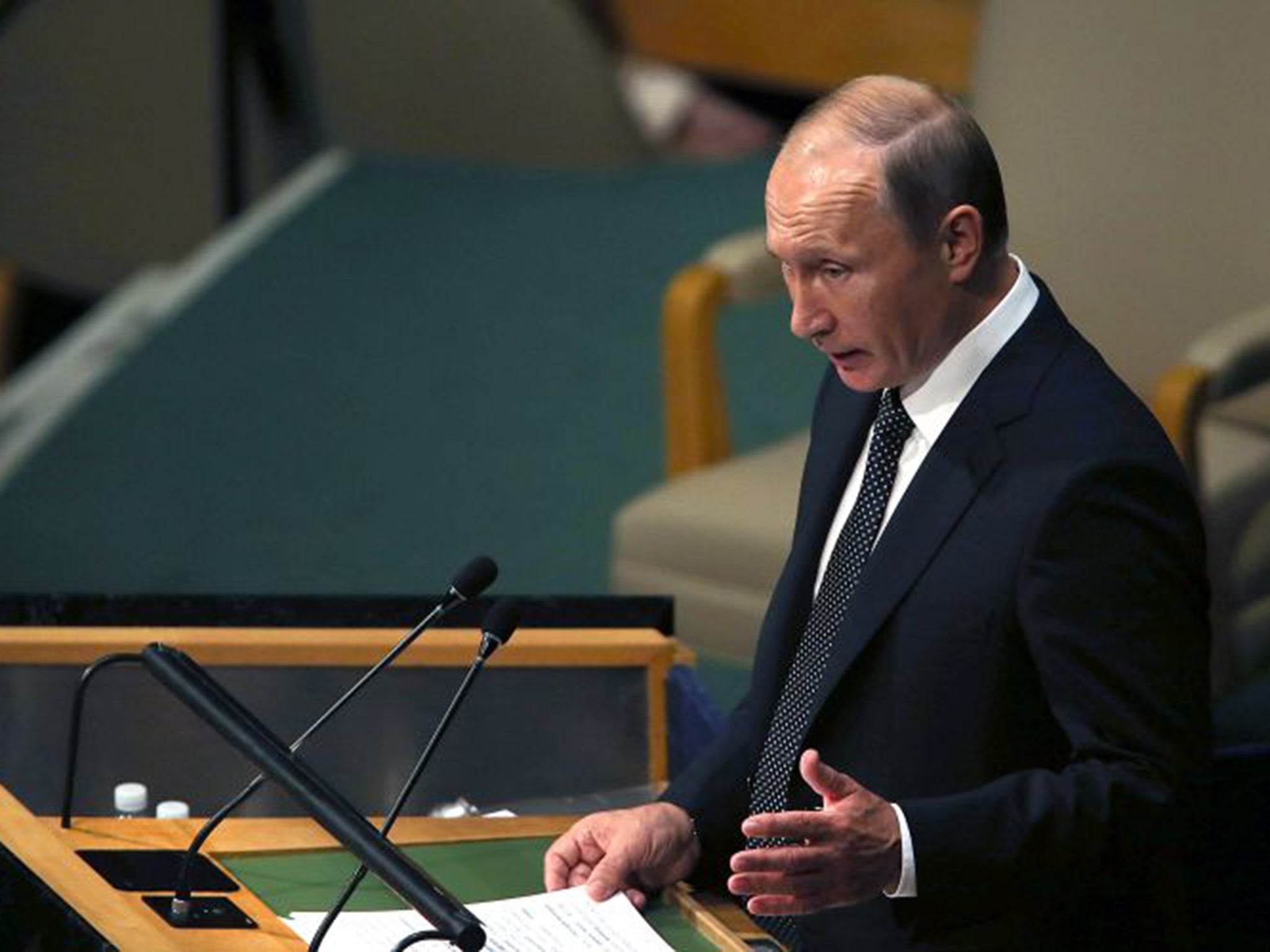Barack Obama and Vladimir Putin clash over competing visions for Syria
- The pair's duelling speeches serve as a preview for their private meeting
- Syrian civil war has killed more than 250,000 people and resulted in a flood of refugees
- First face-to-face encounter in nearly a year comes as Russia increase their military engagement

Your support helps us to tell the story
From reproductive rights to climate change to Big Tech, The Independent is on the ground when the story is developing. Whether it's investigating the financials of Elon Musk's pro-Trump PAC or producing our latest documentary, 'The A Word', which shines a light on the American women fighting for reproductive rights, we know how important it is to parse out the facts from the messaging.
At such a critical moment in US history, we need reporters on the ground. Your donation allows us to keep sending journalists to speak to both sides of the story.
The Independent is trusted by Americans across the entire political spectrum. And unlike many other quality news outlets, we choose not to lock Americans out of our reporting and analysis with paywalls. We believe quality journalism should be available to everyone, paid for by those who can afford it.
Your support makes all the difference.US President Barack Obama and Russian President Vladimir Putin have clashed over their competing visions for Syria, with Obama urging a political transition to replace the Syrian president but Putin warning it would be a mistake to abandon the current government.
Obama and Putin's dueling speeches at a United Nations General Assembly summit served as a public preview of their private meeting late on Monday. The sit-down marks their first face-to-face encounter in nearly a year and comes amid escalating Russian military engagement in Syria.
Obama said he was open to working with Russia, as well as Iran, to bring Syria's civil war to an end. He called for a "managed transition" that would result in the ouster of Syrian President Bashar Assad, whose forces have clashed with rebels for more than four years, creating a vacuum for the Islamic State and other extremist groups.
"We must recognize that there cannot be, after so much bloodshed, so much carnage, a return to the pre-war status quo," Obama said.
Putin, however, urged the world to stick with Assad, arguing that his military is the only viable option for defeating the Islamic State.
"We believe it's a huge mistake to refuse to cooperate with the Syrian authorities, with the government forces, those who are bravely fighting terror face-to-face," Putin said.

Obama and Putin's disparate views of the grim situation in Syria left little indication of how the two countries might work together to end a conflict that has killed more than 250,000 people and resulted in a flood of refugees.
Despite Obama's staunch opposition to Assad remaining in power, the U.S. has struggled to energize a political process to push him from power. Russia has long been a major obstacle, shielding Assad from U.N. sanctions and continuing to provide the Syrian government with weapons.
In fact, Russia has appeared to deepen its support for Assad in recent weeks, sending additional military equipment and troops with the justification that it is helping the government fight the Islamic State. The military buildup has confounded U.S. officials, who spent the summer hoping Russia's patience with Assad was waning and political negotiations could be started.
While Putin didn't call out the U.S. by name, he criticized efforts to arm "moderate" rebels in Syria, saying Western-backed fighters have later come to join the Islamic State.
The U.S. has little to show for its efforts to build a moderate Syrian ground force that can effectively fight the extremists. A $500 million Pentagon program was supposed to train and equip more than 5,000 fighters, but has instead successfully produced only a handful.
Obama and Putin each framed his case for Syria's future in the context of a broader approach to the world, launching veiled criticisms at each other.
The U.S. president criticized nations that believe "might makes right," and he sought instead to highlight the benefits of diplomacy. He touted his administration's efforts to restore ties with Cuba after a half-century freeze and the completion of a nuclear accord with Iran, noting that Russia was a key partner in negotiating the Iran deal.
Putin, without naming the United States, accused Washington of trying to enforce its will on others and mulling a possible reform of the U.N., which he suggested stands in the way of the perceived U.S. domination.
"After the end of the Cold War, the single center of domination has emerged in the world," Putin said. "Those who have found themselves on top of that pyramid were tempted to think that since they are so strong and singular, they know what to do better than others and it's unnecessary to pay any attention to the U.N."
Obama and Putin have long had a strained relationship, with ties deteriorating to post-Cold War lows after Russia annexed Crimea from Ukraine and allegedly backed rebels in Ukraine's east. The U.S. has sought to punish Russia through a barrage of economic sanctions and diplomatic isolation, including no formal bilateral meetings between Obama and Putin.
U.S. officials said the crisis in Syria, as well as the continued conflict in Ukraine, necessitated an in-person meeting with Putin. In addition to assessing the Russian leader's maneuvers in Syria, officials said Obama would push Putin to fully implement a shaky peace deal for Ukraine, including allowing local elections to go forward next month without interference.
Obama, in his address to the U.N., said Washington wasn't seeking a return to the Cold War but couldn't stand by while Ukraine's sovereignty was being violated.
"If that happens without consequences in Ukraine, it could happen to any nation gathered here today," Obama said.
Associated Press
Join our commenting forum
Join thought-provoking conversations, follow other Independent readers and see their replies
Comments